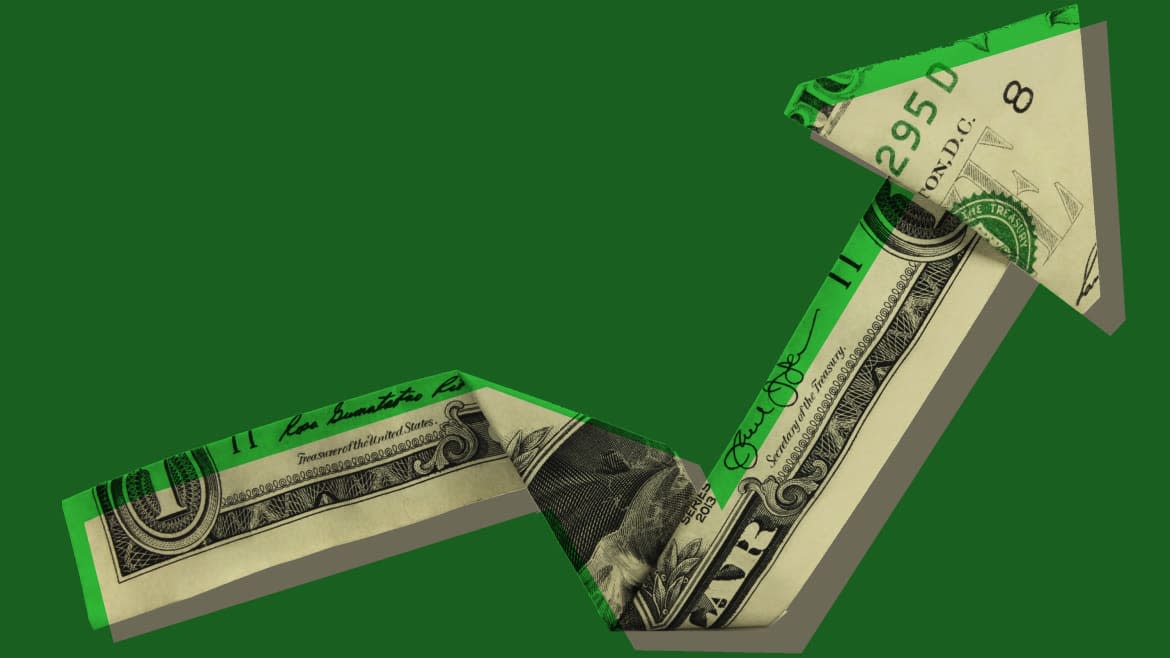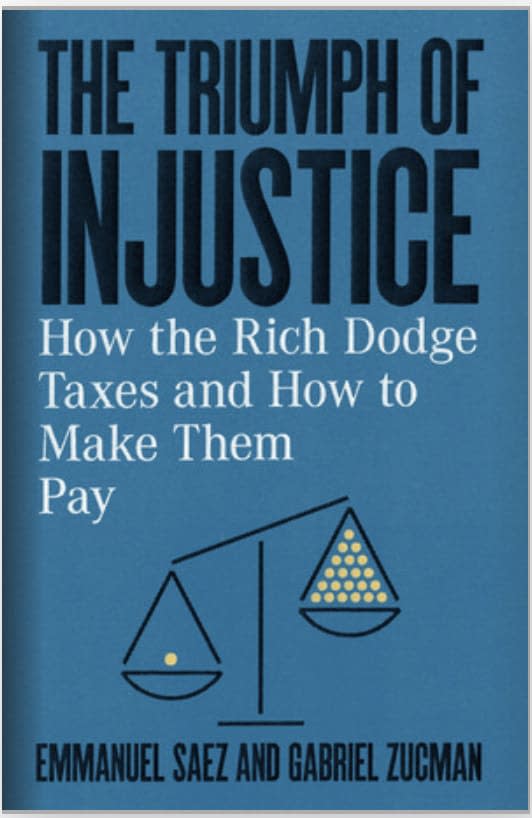Warren's Brain Trust: Revive the Tradition of Tax Justice

A couple of weeks ago, a Fox and Friends journalist sat down with a voter in a Columbus, Ohio, diner after the Democratic debate which was held Oct. 15 at nearby Otterbein University. The reporter asked the voter if he was concerned that “taxes for proposals by Bernie and Elizabeth Warren could be as high as 90 or 97 percent?”
The voter wasn’t.
“Back in the ’60s and ’70s, if you were a millionaire your taxes were already high,” the man, a self-described Democrat, responded. “Nobody bitched about it then. And we still made lots of billionaires.”
This voter may have been reading the new tax policy manifesto The Triumph of Injustice: How the Rich Dodge Taxes and How to Make Them Pay by two Warren advisers, University of California, Berkeley, economists Emmanuel Saez and Gabriel Zucman.
The proposal for a tax on fortunes exceeding $50 million has emerged as a controversial pillar in the presidential campaign of on-and-off Democratic frontrunner Senator Elizabeth Warren’s presidential campaign. This tax, which targets wealth rather than income alone, represents not only an affront to the Republican Party’s supply-side orthodoxy. It also bucks the persistently moderate status quo of Democratic Party tax policy.
Elizabeth Warren’s Ultra-Millionaire Tax Isn’t Just Smart Policy, It’s Brilliant Politics
It may seem politically far-fetched. But one measure that critics are taking the idea seriously is the sheer volume of ink generated by the proposal. In the last month alone, the Wall Street Journal alone has run four op-eds trashing Warren’s plan and the economists’ work. Also joining the pile-on: Clinton-era Treasury Secretary Larry Summers and Universal Basic Income Democratic candidate Andrew Yang.
For Zucman, the controversy is part of the point.
“What we’re trying to do is reconnect with the tradition of tax justice that exists in the U.S.,” he said in a recent interview. “People have forgotten to a large extent how radical the U.S. has been when it comes to regulating the economy through the tax system and regulating inequality and—to some extent—property through the tax system.”
Zucman and Saez’s book carves out provocative new ground in this debate. It charts the Trump-era tax system, which the economists argue has created a regressive tax where working-class Americans pay higher rates than billionaires and creates a “new engine of inequality.” (This conclusion, which headlines the book, has prompted criticism about the economists’ methodology for calculating tax burdens—which the authors address in a new working paper.) The book also explores the historical divide on taxation. It points to colonial Massachusetts as an innovator in wealth taxation, while arguing that “few have done more to perfect the anti-tax narrative than Southern slaveholders.” But it is one of the solutions the book offers—a wealth tax—that has drawn the men’s work into current politics.
Targeting the ultra-rich opens Saez and Zucman up to criticism from powerful quarters. But this is central to the authors’ notion of “tax justice,” a term which Zucman defined in a single word: “progressivity.”
“Which means that the richer you are, the higher your tax rate should be,” he said.
In a recent paper for the Brookings Institution, the economists offer a picture of what this would look like. They calculated what the fortunes of the wealthiest Americans would currently look like had a wealth tax been in place since 1982. For example, Jeff Bezos’ pre-divorce fortune of $160 billion would become half of that under a Warren-style plan at a rate of 3 percent taxation on wealth above $1 billion. A more ambitious rate of 10 percent would leave Bezos with $24 billion.
“OK, $24 is much less than $160 billion, but that’s still $24 billion,” Zucman said. “He would still be the richest man in the country. And, uh, that’s still a ton of money.”
For the billionaire class, who stand to lose the most from the proposed policies in Triumph, Zucman echoed Warren’s famous viral moment from 2011.
“You’re rich because society has allowed you to be rich,” he said.
The allure of progressive taxation is undeniable, the authors argue. Increased tax revenue would empower the government to confront some of society’s most damning challenges, including wealth inequality, the rising costs of healthcare and insurance, and how to combat climate change—while improving the quality of our democracy. While disturbing trends make the moral imperative increasingly apparent, whether it is a $960 billion budget deficit triggered by the Trump tax cuts or the link researchers have drawn between wealth and life expectancy in Americans.
But progressive taxation also presents political problems. The Oct. 15 debate in Ohio made it clear that Democratic candidates weren’t going to wait for Republicans in the general election to make taxes a defining campaign issue.
When Senator Warren was asked whether she would rely on increased taxes on the middle class to fund her Medicare for all proposal, she evaded the question. And Mayor Pete Buttigieg took his shot.
“No plan has been laid out to explain how a multi-trillion-dollar hole in this Medicare for All plan that Senator Warren is putting forward is supposed to get filled in,” he said.
Zucman is impatient with this way of framing the debate. In Triumph he argues that health insurance is, in effect, a poll tax.
“It is, economically speaking,” he said. “What the government does is, it mandates employers to collect a tax and to remit it to private insurers. That’s how the system works. The specificity of that private tax is that it is the most unfair possible type of tax: it is exactly the same amount no matter your income.”
A plan that reduces health-care costs—even one that includes additional taxes for the middle class—amounts to a tax cut, in his view.
Warren eventually released her $20 trillion plan last Friday, which calls for a combination of cuts to military spending and tax increases footed by employers and wealthy individuals—including an “Ultra-Millionaire Tax,” of 2 cents on each dollar of wealth above $50 million and 3 cents on every dollar above a billion.
Zucman is also impatient with critics who say a progressive taxation system will cause capital to flee.
“Tolerating avoidance and evasion, that’s a choice that policymakers make,” he said. “We can choose a form of globalization with tax coordination, exchange of bank information, financial registries to record wealth.”
The politics of progressive taxation remain a question—as seen in last month’s debates. Zucman points to some recent polling of Warren’s tax plan that shows that “this is hugely popular.”
“Democrats are moving towards Elizabeth Warren,” he said. “What’s striking is the disconnect that has existed over the last decades between [candidates] and what the electorate wants.”
Yet the longer-term view of public opinion is less emphatic. According to Gallup polling, Americans only narrowly favor heavily taxing the rich.
Triumph may be the best—and only—tax policy book many Americans read this year, not because of the success of the economists’ analysis, or the reasoning underlying its arguments, but because it tackles a problem shaping our democracy. And in doing so it makes a simple, ethical argument for fairness that readers who aren’t economists will understand.
“There’s no natural right to be rich like that and pay lower tax rates than the rest of the population,” Zucman said.

Get our top stories in your inbox every day. Sign up now!
Daily Beast Membership: Beast Inside goes deeper on the stories that matter to you. Learn more.

 Yahoo News
Yahoo News 
